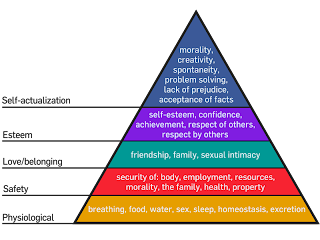In my previous article I wrote about Frederic Taylor and his believe in the competences of people. People were considered as the biggest national resource for further development.
Unfortunately his believes were twisted by many industrialists at that time. Most industrialists tried to maximize the profits and refused to share this with their employees. At that time most welfare was in hands of a few families who didn’t consider the working class as equal men.
When did we become interested in the working class ?
Before the world wars there was a new political change in Europe ; socialist parties appeared and defended the working class. During the world wars there still was a big distinction between the rich and the poor. The poor men often sent to the most dangerous places and were sacrificed for the glory of their country (read the rich). During WW I in Belgium one of the dying soldiers wrote with his blood on a wall the legendary words “I give you my blood, when do you give us our rights” (hier ons bloed, wanneer ons recht).
After the two world wars Europe needed the working class to recover and to rebuild the cities, factories and welfare. Even more important, in many European countries more and more people got the right to vote for elections. And that was the big turning point when industry and politics became interested in all people.
At that time a lot of motivational theories were developed. Some of them are still very much alive in management classes today, despite the fact that they are often very high-level academic.
Maslow – what do people need ?
Abraham Maslow developed the “Hierarchy of needs”. In this pyramid he describes 5 levels of what people need and it starts with physiological needs (food, water, sex, home, …). One level needs to be fulfilled before someone can develop towards a higher level.
This hierarchy of needs is still often used in management classes, but it is also criticized because of the lack of empirical support.
McGregor theory X & Y
Another theory was developed by Douglas McGregor, Professor at MIT School of Management. He created a continuum with on the one side X-management and on the other side Y-management. Today X&Y are translated in hard & soft management style.
X-management | Y-management |
· Employees are lazy and will avoid work if they can · Employees show little or no ambition · Money is the most important drive for employees · Managers need to follow-up employees closely and use control-systems | · Employees are motivated and ambitious · Recognition and personal development are equally important than money · Since employees exercise self control, managers don’t need to follow them up |
Maslow, McGregor and the 2008 financial crisis
During the crisis many people lost their jobs and were facing great difficulties to find a new one. This resulted often in lower self-esteem, loss of friendships and sometimes even in a lack of food and other basic needs. Before the crisis we lived in a very prosperous economy. Most people’s needs were fulfilled. As from one day to another the hierarchy of needs was attacked and thus also motivation of people.
On top of that, many managers managed in a pure X-management style. People were squeezed like lemons and if they were of no more use, they were thrown away. Taylor would have considered this as big waste of national resources and capability to grow.
People were often treated with few respect. Because of that the motivation-level dropped tremendously but people stayed in their job, because they were afraid to not find a new job anymore.
What can we learn from this ?
Today, due to the high number of vacancies, many people leave their bosses and companies, which causes a big brain-drain of expertise in those companies. The number of job-leavers is in many companies 10 times higher today than before the crisis.
Because of the disrespect of people’s needs and the way people were treated, many companies lost a lot of their resources and they now need to re-invest to recover.
Did they learn from it ? I don’t know. If we go to a new financial crisis I truly hope that managers will think twice and I hope they’ll remember the lessons they learned from the 2008 crisis.
Next time :
In my 3th article about this topic, I will first show you some statistic data and end with lessons we can learn from the past, to be better prepared for the next crisis.

No comments:
Post a Comment